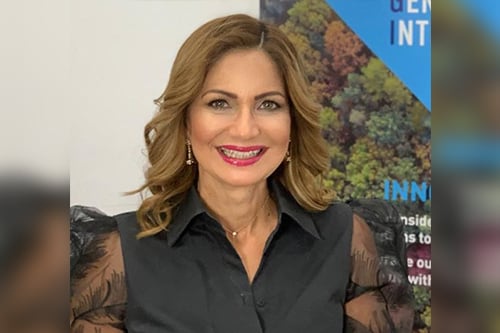

Dive In, the insurance industry’s diversity and inclusion (D&I) festival, will take place from September 22-24 this year, and the 90+ events included will cover everything from gender diversity, to social mobility, to allyship. The festival is a concrete signposting of the action the industry is taking to embrace the principles of inclusivity and for Aaida Abu Jaber (pictured), the PR and marketing manager at IGI, Dive In represents an incredible opportunity to highlight the insurer’s ambition to give back to society.
Read more: Registration now available for Dive In
As the D&I champion of IGI, Abu Jaber has made it her mission to put corporate social responsibility at the heart of this organisation’s agenda. Since joining three years ago, she has driven a variety of initiatives to promote progressive leadership, from involvement with the Dive In Festival for three years running, to running grassroots campaigns to overcoming the barriers many women face when entering the job market in remote areas.
2020 is already off to a bold start for IGI with the hiring of new female senior hires, helping increase female representation in the upper echelons of the business. Its focus for this year is on fostering, and the evolution of, internal female talent, Abu Jaber said, and on preparing these women to be future leaders. The first step has been utilising the Career Excel programme, an 18-session leadership course coaching IGI’s female talent on how to explore all leadership avenues available.
This, in turn, is the theme at the heart of IGI’s Dive In webinar, taking place on the September 23, which aims to provide men and women with the right skills to become effective leaders. Abu Jaber highlighted how personality intrinsically feeds into leadership styles and how this event will see trained specialists explore what the personality of attendees says about their leadership style using Enneagram, a personality typing system.
“Enneagram has been used since the 1970s and is used by psychologists as a personality theory that describes nine ways or strategies that the psyche deals with your own self and with others,” she said. “And each of these nine types has strong points and blind spots, and each personality type has a predictable behaviour pattern when it comes to both good times and stressful times. So, when you find out which of these personality types you are, you will find out our basic desires and your basic fears, and how a personality like yours responds to stress and to good times.
“And you may think you know these things about yourself but this [clearly identifies] both your strengths and your weaknesses. And once you know these, and can admit ‘yes, I am like that’ then you can monitor your behaviour at work, or with your spouse, or with your child because you are more aware of this… You can understand why people may not listen to you or may not co-operate with you at work and you can use this information to improve yourself. If you are serious about knowing yourself, you will be able to work on your weak points and improve them.”
IGI’s event will see a specialist outline and discuss a general assessment which is catered towards those looking to a leadership track, she said, and which will encourage those working in the insurance industry to take up stress management techniques that will work for their specific personality type. Having taken the test herself, she was startled by how accurate the Enneagram test was in highlighting her personality as a ‘competitive achiever’. Hearing the associated strengths and blind spots associated with this personality type was genuinely enlightening and in her own professional and personal sphere Abu Jaber has found significant practical applications of this knowledge.
“The major takeaway [from the Enneagram test] is that every personality type can be a leader,” she said. “That’s what I want everybody to take away from our session is that… each type can be a leader if they want to be. Anybody who wants to be a leader, or already is in a position of leadership and wants to improve that, can do so, you just need to work on it.
“This is really about self-development and self-improvement. And women perhaps need to work on this a bit more because, over time and history, we have traditionally been the caregivers, the moms, the daughters and the sisters, and we’ve been seen as the more empathetic [gender], but we can still be good leaders.”
Women really need to discuss how they can access their leadership capabilities in an industry which is finally figuring out the attributes that women can bring to senior positions, she said. Now is a great time for women in the insurance sector, which has moved on leaps and bounds from where it was 20 or so years ago.
The most essential part of really bringing such initiatives full circle, however, she said, is addressing the role of women in supporting other women. This cannot be underestimated, as it is through this support network and through the assistance that female leaders can give to those at lower levels in an organisation through mentorship, sponsorship and role modelling that the rightful place of women in the insurance industry can truly be realised.
